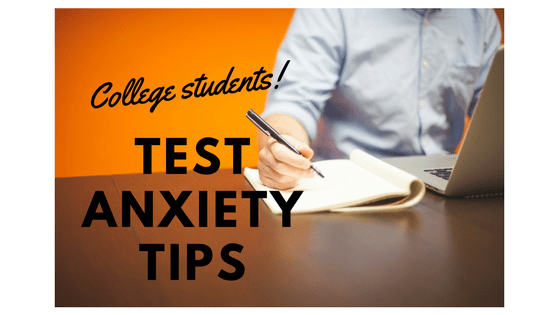Freedom in college feels good right? Well, not when you have finals coming up! Here are some test anxiety strategies for college students that will help you manage the pressure and do well on your exams.
Tip #1: Get organized
One of the most important test anxiety strategies for college students is to get organized and create a study plan. If you think that’s an obvious strategy, then you’re right! Research has shown that test anxiety is higher when your workload is higher (Sansgiry & Sail, 2006). Staying organized helps you break your work into manageable steps, manage your workload and reduce your stress.
Tip #2: Use a study technique that works for you
Tip #3: Schedule an appointment with a school counselor
If exams stress you out, visit with a school counselor. They can give you an expert advice on how to reduce test anxiety. You can talk to them about how you feel about tests, figure out why you are feeling anxious about an exam, and find a solution to relieve the symptoms causing the anxiety. If you are feeling anxious about an upcoming exam, make an appointment with a counselor today.
Tip #4: Use relaxation techniques
Developing relaxation techniques can give you some peace. Controlled breathing is a relaxation technique that is helpful. It’s also referred as pranayama. Pranayama has been shown to have positive results on test anxiety and performance (Nemati, 2013).
Tip #5: Find a tutor; teach a friend
There are free tutors available on college campuses. Sometimes college classes may be very large limiting the amount of time that you can further discuss class materials with a teacher. So use tutor services as much as you can. Then when you grasp the concept teach it to someone else. This helps you retain the information.
Tip #6: Stay healthy
Staying healthy is important to performing well on exams. Eating well and exercising have been shown to improve your test scores. The Center for Disease Control and Prevention (CDC) published an article on how eating well and exercising helps academic performance. Some of the benefits are:
You can even use the Pomodoro technique to include exercise or eat healthy while studying. During the 5 minute break, you can either exercise or eat a quick but healthy snack.
One last tip! Don’t wait last minute to start studying for your finals.
Share your test anxiety strategies for college students!
What are your tips for test anxiety? What has worked for you? Share your test anxiety strategies for college students in the comments at the bottom of the page.
References
Center for Disease Control and Prevention. (2014). Health and academic achievement. Retrieved from https://www.cdc.gov/healthyyouth/health_and_academics/pdf/health-academic-achievement.pdf
Nemati, A. (2013). The effect of pranayama on test anxiety and test performance. International Journal of Yoga, 6(1), 55-60. doi:10.4103/0973-6131.105947
Sansgiry, S. S., & Sail, K. (2006). Effect of Students Perceptions of Course Load on Test Anxiety. American Journal of Pharmaceutical Education, 70(2). doi:10.5688/aj700226


